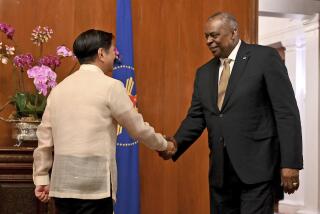U.S. Near Accord for Gulf Military Headquarters
- Share via
RIYADH, Saudi Arabia — The United States is near agreement on establishing a permanent military headquarters in the Persian Gulf region, an American goal long blocked by Arab countries, the commander of allied forces here said Sunday.
Gen. H. Norman Schwarzkopf said that the U.S. Central Command, which oversees military operations in the Middle East, will continue to be based in Tampa, Fla. But a portion of the Central Command’s headquarters will likely be positioned for the first time in the Gulf, he said.
Schwarzkopf’s statements, made to a group of reporters in the Saudi capital, come amid growing speculation over the form and size of presence that the United States intends to maintain in the Gulf in the wake of the crushing allied defeat of Iraq.
“There’s a possibility that we will move a forward headquarters element of Central Command, not the entirety of the Central Command . . . someplace over here in the Gulf,” Schwarzkopf said.
“But,” he added, “there’s an awful lot of negotiations that have to go on. The locations have to be accepted, and a lot of the arrangements have to be made. . . . We’re certainly much closer to that now than we’ve ever been before.”
Schwarzkopf reiterated U.S. intentions not to keep a permanent ground force in the region. He said that American service personnel--primarily logistics experts, stevedores and cleanup crews--will probably remain in Saudi Arabia another eight to 10 months to dismantle the huge war machine assembled for Operation Desert Storm.
But the “vast majority” of the total of 540,000 U.S. military men and women deployed for the Gulf War will go home much sooner, he said.
Schwarzkopf appeared to contradict his boss, Gen. Colin L. Powell, chairman of the Joint Chiefs of Staff, on the question of maintaining U.S. troops in southern Iraq. American forces occupy about 15% of Iraq south of the Euphrates River.
Powell was quoted last week in Washington as saying the United States would continue to hold land in southern Iraq “for some months to come” to keep pressure on Iraqi President Saddam Hussein.
But Schwarzkopf said that he and Powell have discussed the plans and that he believes “there was a slight misstatement.”
“Obviously, we can stay over here as long as we need to, but I don’t think we are prepared to stay there for a very, very long time,” Schwarzkopf said. “We certainly don’t WANT to stay there for a long time.”
Withdrawal from Iraq, he said, will depend on a permanent, formal cease-fire to be hammered out at the United Nations.
Positioning part of Central Command headquarters in the Gulf represents a departure from policy of the last several decades.
The United States has maintained a naval presence in the Arabian Sea and the Persian Gulf since shortly after World War II. But Arab nations had steadfastly refused to allow any command-and-control operation to be set up on their shores.
Now, with concern over postwar security in the region heightened by the continued turmoil inside Iraq, Arab leaders have been talking privately with U.S. leaders about the need for future cooperation.
Saudi Arabia has already agreed with the other Gulf states to form a peacekeeping force with Egypt and Syria designed to build up their shared defenses.
A Western diplomat in Riyadh said a “very active” schedule of joint air, land and sea exercises involving U.S. and Arab forces is also in the works.
Schwarzkopf did not specify where in the Gulf the Central Command headquarters might be placed. He reiterated that the United States does not plan to put permanent bases for ground troops in the Gulf and denied rumors that Kuwait had requested it.
“There’s been nothing officially asked by any government for us to maintain a permanent military ground presence over here,” Schwarzkopf said, “and we have no intention of doing that.”
More to Read
Sign up for Essential California
The most important California stories and recommendations in your inbox every morning.
You may occasionally receive promotional content from the Los Angeles Times.











